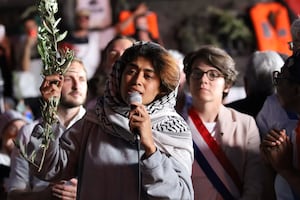Israel has refused to extend the residency visa of a senior UN humanitarian official due to his comments on the Gaza war, accusing him of spreading "lies".
Jonathan Whittall, head of the UN Office for the Coordination of Humanitarian Affairs in Gaza and the West Bank, will be forced to leave his home in Jerusalem after Israel's Foreign Minister Gideon Saar ordered his permit be withdrawn.
Mr Whittall, a South African, regularly visits Gaza and has repeatedly condemned the humanitarian conditions in the enclave. In April, he said Gazans were "slowly dying" due to the effects of Israel's war.
"I have instructed not to extend the residency permit of the head of the OCHA office in Israel, Jonathan Whittall," Mr Saar wrote on X in Hebrew.
He said Mr Whittall had engaged in "biased and hostile conduct against Israel, which distorted reality, presented false reports, slandered Israel and even violated the UN's own rules regarding neutrality".
"Whoever spreads lies about Israel - Israel will not work with him," Mr Saar said.

Mr Saar's decision is the latest taken by Israel against senior UN officials. UN spokesman Stephane Dujarric said last week that visas for three heads of UN agencies working in Gaza – the OCHA, human rights agency OHCHR, and the UN's Palestinian relief agency UNRWA – had not been reissued.
“Visas are not renewed or reduced in duration by Israel, explicitly in response to our work on protection of civilians,” OCHA chief Tom Fletcher told the UN Security Council earlier this month.
The UN has been critical of Israel over the humanitarian crisis in Gaza. On Sunday the OCHA said Israel's latest eviction order in Gaza, this time in the Deir Al Balah area, would deal "another devastating blow" to aid efforts.
On Sunday morning, the Israeli military ordered Gazans in the area to leave immediately due to imminent operations. The area is where many international aid organisations have attempted to distribute aid.
But the OCHA said UN staff were "remaining" in the territory and their coordinates had been shared with "relevant parties", the agency said. At least 1,000 Gazan families had already fled, it added.
"UN staff are remaining in Deir Al Balah, spread across dozens of premises," it said. "These locations – as with all civilian sites – must be protected, regardless of displacement orders."
The area contains several humanitarian warehouses, four primary health clinics, four medical points, and critical water infrastructure including three wells, one reservoir, one solid waste dumping site and one wastewater pumping station, the OCHR said.
It warned that any damage to the facilities "will have life-threatening consequences".
Between 50,000 and 80,000 people were in the area when the evacuation order was issued, according to OCHA estimates.
Since the start of the war, nearly all of Gaza's population – which is also facing severe food shortages – has been displaced at least once by repeated Israeli eviction orders.
According to the OCHA, the latest order means that 87.8 per cent of Gaza's area is now under displacement orders or within Israeli militarised zones.
That leaves "2.1 million civilians squeezed into a fragmented 12 per cent of the strip, where essential services have collapsed", the UN agency said.
"The new order cuts through Deir Al Balah all the way to the Mediterranean Sea, further splintering the strip," it said. "It will limit the ability of the UN and our partners to move safely and effectively within Gaza, choking humanitarian access when it is needed most."


